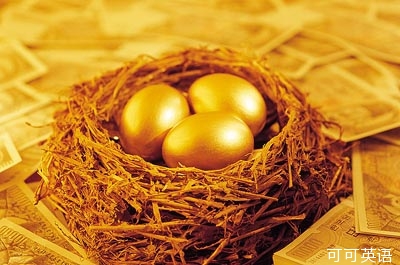
You know the smartest things to do with your money. But what are the worst moves? What should you avoid?
自己的錢該怎么打理才最明智,對此你一定心知肚明。但是你知道最糟糕的做法是什么嗎?哪些是你應該避免的呢?
Weirdly enough, they are things that a surprising number of people are still doing─even though they probably know, in their heart of hearts, how foolish they really are.
奇怪的是,那些應該避免的事情卻有很多人仍然在做,而且人數(shù)之多讓人瞠目──盡管這些人在內(nèi)心深處可能很清楚自己的做法實際上有多愚蠢。
Any list is going to be incomplete. But here are five to avoid.
想把這些蠢事一個不落地全列出來恐怕不可能。不過我們可以試著列出其中的五件。
1. Reaching for yield
1. 追求高收益率
What this country needs is a good 5% certificate of deposit. Instead the collapse in interest rates, and the Federal Reserve's policy of keeping them down for as long as possible, is driving people crazy─especially people who need to generate income from their investments.
美國這個國家需要的是收益率能夠達到5%的定期存單。然而,這里有的只是利率的一降再降,以及聯(lián)邦儲備委員會(Federal Reserve)盡量將利率維持在低位的政策,這樣的現(xiàn)狀逼得人們愈加瘋狂──對于那些需要從投資中獲取收益的人而言尤其如此。
In these circumstances, people start to do really foolish things in the desperate hunt for higher interest rates. That includes taking on crazy amounts of risk, or investing in complex products they don't understand, in the hope of higher yields. The Fed is producing a bull market in scams, Ponzi schemes and associated rackets.
在此環(huán)境下,人們在絕望地尋找著更高的收益率,并為此開始犯下著實愚蠢的錯誤。這其中包括為爭取獲得更高的收益率而不惜承擔極高的風險、或是投資那些他們毫不了解的復雜產(chǎn)品。美聯(lián)儲正在打造著一個各類陰謀、旁氏騙局和欺詐手段層出不窮的牛市。
The Securities and Exchange Commission recently warned about an epidemic of bogus high-yield 'corporate promissory notes' being marketed to investors by scam artists.
美國證券交易委員會(Securities and Exchange Commission)最近提醒投資者小心,目前市場中有一種由騙子發(fā)行的虛假高收益“企業(yè)本票”在大量傳播。
The Wall Street Journal's Jason Zweig highlighted the woes of those sold complex 'reverse convertibles, ' a legal but complicated product with embedded risks. Eric Lewis, chief investment officer of Bedrock Capital Management in Los Altos, Calif., suggests that if you can't explain an investment to a friend, including what might go wrong, you should think twice.
《華爾街日報》(The Wall Street Journal)的杰森•茨威格(Jason Zweig)指出了那些賣出“反向可轉(zhuǎn)債”這一復雜產(chǎn)品的投資者所面臨的困境,“反向可轉(zhuǎn)債”是一種合法的金融產(chǎn)品,不過此類產(chǎn)品結構復雜,其本身存在著潛在的風險。加利福尼亞州洛斯阿爾托斯(Los Altos)的資產(chǎn)管理公司Bedrock Capital Management的首席投資長埃里克•劉易斯(Eric Lewis)建議,如果你無法向自己的朋友解釋清楚一項投資,包括這項投資可能會面臨什么風險,那么你最好三思而行。
A high-yield bond fund such as the iShares High Yield Corporate Bond exchange-traded fund (HYG), which lends money to risky companies, sports a yield of about 5%. That's the maximum yield you can earn without taking on much more risk.
諸如安碩高收益率企業(yè)債交易所交易基金(iShares High Yield Corporate Bond exchange-traded fund)這樣的高收益率債券基金為風險較高的企業(yè)提供貸款,這類基金的收益率約為5%。這是你在不承擔過高風險的情況下能夠掙到的最高收益率。
2. Going into the poor house to send Junior to a country-club college
2. 傾家蕩產(chǎn)送孩子去私立大學讀書
Over the past 40 years, the cost of tuition and fees at a private university has tripled─after accounting for inflation. The cost of a public university has quadrupled.
過去40年來,美國私立大學的學費以及各種開銷增長了兩倍──扣除了通貨膨脹因素之后。公立大學的就讀成本則是40年前的四倍。
The cost of getting a bachelor's degree has become a scandal in this country. Students spend $160, 000 on a four-year degree and the results are too often questionable.
在美國攻讀一個本科學位所需開銷數(shù)字之大,簡直成了這個國家的恥辱。學生完成為期四年的學位攻讀需要花費16萬美元,而學習的效果往往還很成問題。
Financial planners strongly advise parents against plundering their own retirement savings, which they are likely to need, to pay for this.
理財專家們強烈建議學生家長們不要將自己的養(yǎng)老積蓄用來為孩子付學費,這筆錢他們自己可能還用得著。
Admittedly, a degree has become a protection racket─you can't get a job without one, but there are fewer jobs for those with them. But the smart move for the budget-constrained is to get a bachelor's degree at a public university. The tuition and fees average less than $9, 000 a year instead of $30, 000 at a private college.
誠然,學位已經(jīng)成為一種護身符──沒有它,你可能找不到工作,不過即便有了學位,職場中能夠提供的就業(yè)機會也少了。而對于預算開支不那么富裕的家庭而言,明智的選擇是去公立大學讀一個本科學位。讀一所美國公立大學每年所需的學費和各種雜費平均不到9,000美元,而私立大學則需要三萬美元。
3. Owning stock in your employer
3. 持有自己所工作企業(yè)的股票
This is one of the silliest and riskiest moves any investor can make. If the company hits trouble, you get whacked twice. You can lose your job and your savings─all in one fell swoop. Ask anyone who worked for Enron…or Lehman Brothers.
這大概是投資者能夠做出的最愚蠢、最冒險的舉動之一了。如果這家公司遇上麻煩,你將遭受雙重打擊。你可能會在丟了飯碗的同時,丟掉自己的積蓄──一桿子打翻一籃子的蛋。不信你去問問那些曾為安然(Enron)、或是雷曼兄弟(Lehman Brothers)工作過的人。


